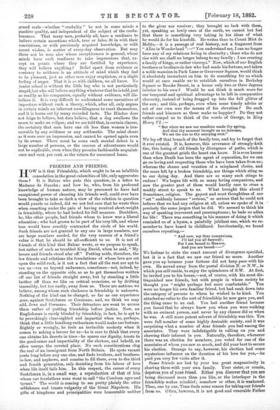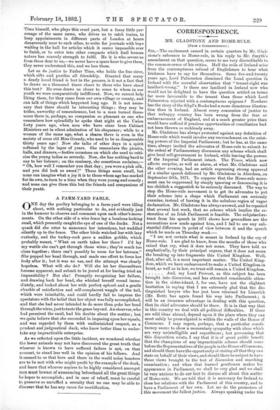FRIENDS AND FRIENDS.
now is it that Friendship, which ought to be an infallible consolation in the great calamities of life, only aggravates them ? It is Balzac who puts this question, in a letter to Madame de Henske ; and how he, who, from his profound knowledge of human nature, may be presumed to have had exceptional power of choosing his friends well, could ever have been brought to take so dark a view of the relation in question would puzzle us indeed, did we not feel sure that he wrote thus when smarting under the pain of having received short-weight in friendship, where he had looked for full measure. Doubtless, he, like other people, had friends whom to know was a liberal education ; who had grown to be part of his very life, and whose loss would have sensibly contracted the circle of his world. Such friends are not granted to any one in large numbers, nor are large numbers needed, for the very essence of a friend's value is that he should be all-sufficient to us. It is not of friends of this kind that Balzac wrote, or we propose to speak, but rather of such as troubled King David, when he said, "My lovers and friends stood afar off." Putting aside, therefore, the few friends and relations the foundations of whose love are set upon the solid rock, is it not a fact that all the rest are apt to vex us—vex us beyond endurance, sometimes—not, indeed, by standing on the opposite side, so as to get themselves written off our list of friends straight away, but by standing a little farther off than we like on critical occasions, or by drifting insensibly, but too easily, away from us. There are nations, we believe, among whom such slackness in friendship is unknown. Nothing of the kind can be charged, so far as our experience goes, against Scotchmen or Corsicans, and, we think we may add, Jews and Germans. Their detractors are wont to accuse them rather of putting friendship before justice. Now, an Englishman is rarely blinded by friendship, in fact, he is apt to be provokingly clear-sighted and impartial when we, perhaps, think that a little headlong enthusiasm would make our fortune. Rightly or wrongly, he feels an invincible modesty when it comes to asking a favour for us—he is sure to think that every one obtains his deserts in time—he spares our dignity, trusts to the good-sense and impartiality of the electors, and behold, an alien usurps the coveted place. No such considerations clog the zeal of an immigrant from North Britain. He spots vacant posts long before any one else, and finds brothers, and brothers-
in-law, and nephews, and cousins to fill them, even to the third and fourth generation, only desisting from his labour of love when life itself fails him. _ In this respect, the career of every
Scotchman is, in a small way, a reproduction of that of him whom our forefathers were wont to call "the Corsican ogre and
tyrant." The world is coming to see pretty plainly the utter selfishness and innate vulgarity of the Great Napoleon. His gifts of kingdoms and principalities were honourable neither to the giver nor receiver; they brought no luck with them, yet, speaking as lowly ones of the earth, we cannot but feel that there is something very taking in his ideas of what he would do for his kinsfolk. He writes thus to Count Miot de Melito,—it is a passage of real history, not a fragment from "Alice in Wonderland ":—" You understand me, I can no longer have any of my relations living in obscurity ; those who do not rise with ma shall no longer belong to my family ; I am creating a family of kings, or rather viceroys." Now, which of our English brothers or brothers-in-law who had made his fortune, and taken a noble mansion in Park Lane or Grosvenor Square, would think it absolutely incumbent on him to do something for us which would at once enable us- to establish ourselves in Berkeley Square or Brooke Street, in a house only two or three degrees inferior to his own ? Would he not think it much more for our temporal and spiritual advantage to be left in comparative obscurity, instead of being dragged up into the full glitter of the sun ; and this, perhaps, even when some timely advice or act of our own was the means of his elevation ? Do such friends and kinsmen as these make us happier? Do they not rather compel us to think of the words of George, in King Henry
Ent when we saw oar sunshine made thy spring, And that thy summer brought us no increase, We set the axe to thy usurping root."
We lop off that branch of the family tree, and try to forget that it ever existed. It is, however, this severance of strongly-knit ties, this losing of old friends by divergence of paths, which is one of the greatest griefs the heart can know. It is even keener than when Death has been the agent of separation, for we can go on loving and respecting those who have been taken from us; whereas the shame and vexation of a misplaced choice, and the scars left by a broken friendship, are things which sting us to our dying day. And there are so many such stings to endure ! We began life with so many loving companions, and now the greater part of them would hardly care to cross a muddy street to speak to us. What brought this about ? Sometimes, religion. The gayest and most thoughtless of our "set" suddenly became "serious," so serious that he could not believe that we had any religion at all, unless we spoke of it in precisely the same jargon that he did. We seemed to think his way of speaking irreverent and presumptuous ; he bade us adieu for life ! There was something in his manner of doing it which reminded us of a hymn, a painfully jubilant one, which we re- member to have heard in childhood. Involuntarily, we found ourselves repeating,—
" And now, my dear companions, I'll bid you all farewell ; For I am bound to Heaven, And you are bound—"
We forbear to state the exact amount of divergence specified, but it is a fact that we saw our friend no more. Another gave you up because your fortune did not keep pace with his own. He moved away from the postal division N. or N.W., in which you still reside, to enjoy the splendours of S.W. At first, he invited you to his house,—not, of course, with his most dis- tinguished new friends, but with people in whose society he thought you "might perhaps feel more comfortable." You were no longer his own familiar friend, but had sunk down into the category of persons to whom he wished to be kind. You attached no value to the sort of friendship he now gave you, and the thing came to an end. You lost another friend because you found that he always knew you when you were walking with an eminent person, and never by any chance did so when he was. A still more potent solvent of friendship was this. You were full member of some highly desirable society, and it was surprising what a number of dear friends you had among the associates. They were indefatigable in calling on you and showing their interest in you. Naturally, therefore, whenever there was an election for members, you voted for one of the associates of whom you saw so much, and did your best to secure his election. Strange to say, however, his election had some mysterious influence on the duration of his love for you,—he paid you very few visits after it.
Some friends are lost by your too great magnanimity in
sharing them with your own family. Your sister, or cousin, deprives you of your friend. Either you discover that you are being discussed more than you like, or the interloper in the
friendship makes mischief; somehow or other, it is weakened. Thus, one by one, Time finds some reason for taking our friends from us. Often, however, it is not good and venerable Father
Time himself, who plays this cruel part, but a fussy little per- sonage of the same name, who drives us to catch trains, to keep appointments in different parts of London at hours dangerously near to each other, to write for journals with boys waiting in the hall for articles which it seems impossible ever -to 'finish, or to enter into other compacts which frail human nature has scarcely strength to fulfil. He it is who severs us from those dear to us,—we never have a spare hour to give them, they never understand this, and we lose them.
Let us do justice to Father Time, who holds the fine sieve, -which sifts and purifies all friendship. Granted that many s dearly loved friend is lost in the process, is it not a fact that 'he draws us a thousand times closer to those who have stood this test? He even draws us closer to some to whom in our youth we were comparatively indifferent. Now, we cannot help liking them, for they came from our own village or county, and an talk of things which happened long ago. It is not neces- sary that these should be interesting things ; they may be trifles, unworthy of remembrance, but to a man turned three- score there is, perhaps, no companion so pleasant as one who 'remembers how splendidly he spoke that night at the Union forty years ago, when men who have since been Cabinet Ministers sat in silent admiration of his eloquence; while to a -woman of the same age, what a charm there is even in the -society of cross old Mies Grundy, who used to be so disagreeable -thirty years ago ! Now she talks of other days in a spirit softened by the lapse of years. She remembers the picnics, balls, and dinners,—festive occasions on which she used to criti- cise the young ladies so severely. Now, she has nothing hard to say to her listener; on the contrary, she sometimes exclaims,— " Oh, how well I remember you that day ; you wore a pink silk, and you did look so sweet !" These things seem small, but sone can imagine what a joy it is to those whom age has marked for its own, to turn to a time when they were young and comely; and none can give them this but the friends and companions of
-their youth.



































 Previous page
Previous page